Filter by
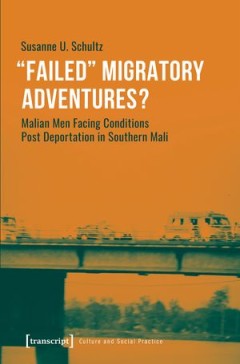
Failed Migratory Adventures?: Malian Men Facing Conditions Post Deportation i…
The effects of the intra-African and European deportation regimes brought about since the European Union's externalization of its migration and development policy by transferring it to countries of sub-Saharan Africa remain largely understudied - especially their effects on people's everyday life after forced returns. Based on extensive field research, Susanne U. Schultz's book analyses the sup…
- Edition
- -
- ISBN/ISSN
- 9783839460092
- Collation
- -
- Series Title
- -
- Call Number
- 301 SCH f
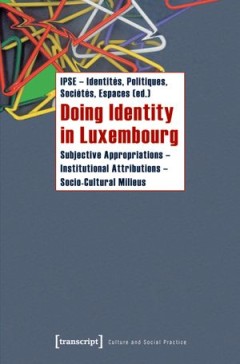
Doing Identity in Luxembourg: Subjective Appropriations - Institutional Attri…
Luxembourg - international financial center, European administrative center, destination country for immigration? This empirical study provides insights about a society that has hitherto largely eluded scientific investigation and observes the processes of identity construction in globalised conditions.The interdisciplinary team of authors exposes the processes of subjective appropriations and …
- Edition
- -
- ISBN/ISSN
- 9783839416679
- Collation
- -
- Series Title
- -
- Call Number
- 301 DOI d
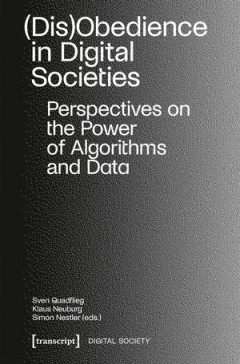
(Dis)Obedience in Digital Societies: Perspectives on the Power of Algorithms …
Algorithms are not to be regarded as a technical structure but as a social phenomenon - they embed themselves, currently still very subtle, into our political and social system. Algorithms shape human behavior on various levels: they influence not only the aesthetic reception of the world but also the well-being and social interaction of their users. They act and intervene in a political and so…
- Edition
- -
- ISBN/ISSN
- 9783732857630
- Collation
- -
- Series Title
- -
- Call Number
- 302.23 OBE o
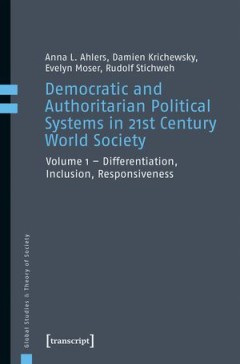
Democratic and Authoritarian Political Systems in 21st Century World Society:…
This book is about the radical novelty of modern polities in a functionally differentiated world society. Premodern states were at the apex of a stratified, hierarchical society. They dominated society and all its groups and strata. Modern polities have to be understood through the ecology of relations among different function systems. They have to find and incessantly redefine their place in s…
- Edition
- -
- ISBN/ISSN
- 9783839451267
- Collation
- -
- Series Title
- -
- Call Number
- 320 DEM d
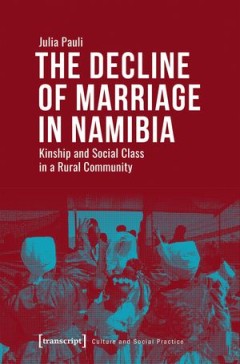
The Decline of Marriage in Namibia: Kinship and Social Class in a Rural Commu…
In Southern Africa, marriage used to be widespread and common. However, over the past decades marriage rates have declined significantly. Julia Pauli explores the meaning of marriage when only few marry. Although marriage rates have dropped sharply, the value of weddings and marriages has not. To marry has become an indicator of upper-class status that less affluent people aspire to. Using the …
- Edition
- -
- ISBN/ISSN
- 9783839443033
- Collation
- -
- Series Title
- -
- Call Number
- 301 PAU d
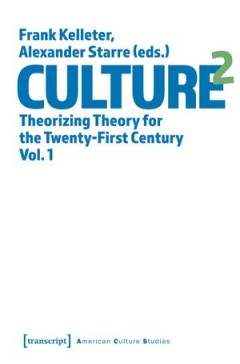
Culture 2: Theorizing Theory for the Twenty-First Century, Vol. 1
How to do cultural studies in the twenty-first century? This essay collection is not a handbook, encyclopedia, or a »state of the field« compendium. Instead, it is a reflexive exercise in cultural studies, featuring fifteen accessible essays on a selection of critical key works published since 2000. The contributors aim to provide readers with a fresh and engaging look at recent criticism, ex…
- Edition
- -
- ISBN/ISSN
- 9783839457870
- Collation
- -
- Series Title
- -
- Call Number
- 306.4 CUL c
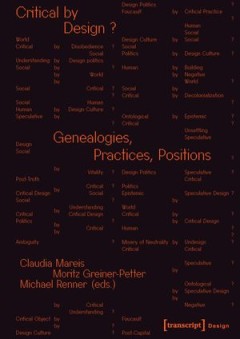
Critical by Design?: Genealogies, Practices, Positions
In its constructive and speculative nature, design has the critical potential to reshape prevalent socio-material realities. At the same time, design is inevitably normative, if not often violent, as it stabilises the past, normalises the present, and precludes just and sustainable futures. The contributions rethink concepts of critique that influence the field of design, question inherent blin…
- Edition
- -
- ISBN/ISSN
- 9783839461044
- Collation
- -
- Series Title
- -
- Call Number
- 391 CRI c
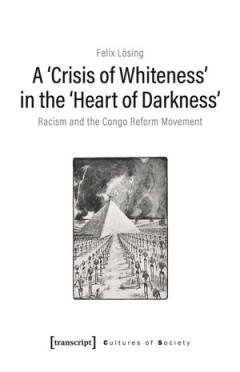
A Crisis of Whiteness‹ in the ›Heart of Darkness: Racism and the Congo Re…
The British and American Congo Reform Movement (ca. 1890-1913) has been praised extensively for its ›heroic‹ confrontation of colonial atrocities in the Congo Free State. Its commitment to white supremacy and colonial domination, however, continues to be overlooked, denied, or trivialised. This historical-sociological study argues that racism was the ideological cornerstone and formed the m…
- Edition
- -
- ISBN/ISSN
- 9783839454985
- Collation
- -
- Series Title
- -
- Call Number
- 302.5 LOS c
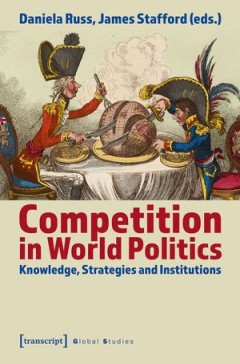
Competition in World Politics: Knowledge, Strategies and Institutions
The »return of great power competition« between (among others) the US, China, Russia and the EU is a major topic in contemporary public debate. But why do we think of world politics in terms of »competition«? Which information and which rules enable states and other actors in world politics to »compete« with one another? Which competitive strategies do they pursue in the complex environme…
- Edition
- -
- ISBN/ISSN
- 9783839457474
- Collation
- -
- Series Title
- -
- Call Number
- 320 COM c
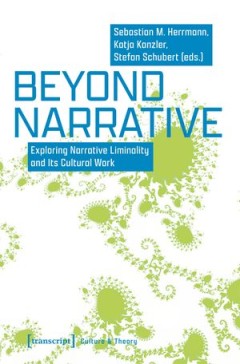
Beyond Narrative: Exploring Narrative Liminality and Its Cultural Work
This book calls for an investigation of the ›borderlands of narrativity‹ — the complex and culturally productive area where the symbolic form of narrative meets other symbolic logics, such as data(base), play, spectacle, or ritual. It opens up a conversation about the ›beyond‹ of narrative, about the myriad constellations in which narrativity interlaces with, rubs against, or morphs i…
- Edition
- -
- ISBN/ISSN
- 9783839461303
- Collation
- -
- Series Title
- -
- Call Number
- 302.23 BEY b
 Computer Science, Information & General Works
Computer Science, Information & General Works  Philosophy & Psychology
Philosophy & Psychology  Religion
Religion  Social Sciences
Social Sciences  Language
Language  Pure Science
Pure Science  Applied Sciences
Applied Sciences  Art & Recreation
Art & Recreation  Literature
Literature  History & Geography
History & Geography